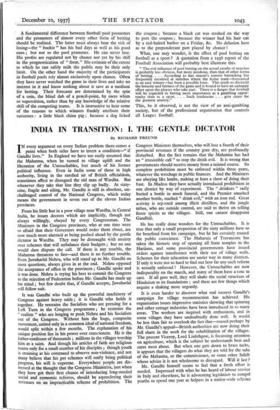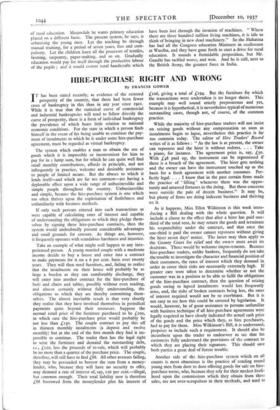INDIA IN TRANSITION: I. THE GENTLE DICTATOR
By RICHARD FREUND
IN every argument on every Indian problem there comes a point when both sides have to insert a condition—" if Gandhi lives." In England we have too easily assumed that the Mahatma, when he turned to village uplift and the liberation of the Untouchables, lost much of his former political influence. Even in India some of those in high authority, living in the rarefied air of British officialdom, sometimes affect to disregard the old man of Wardha. But whenever they take that line they slip up badly. At sixty- nine, fragile and ailing, Mr. Gandhi is still in absolute, un- challenged control of the National Congress, which today means the government in seven out of the eleven Indian provinces.
From his little hut in a poor village near Wardha, in Central India, he issues decrees which are implicitly, though not always willingly, obeyed by every Congressman. The Ministers in the Congress provinces, who at one time were so afraid that their Governors would order them about, are now much more alarmed at being pushed ahead by the gentle dictator in Wardha. They may be distraught with anxiety over schemes that will unbalance their budgets ; but no one would dare dispute the call. If there is any trouble, the Mahatma threatens to fast—and there is no further trouble. Even Jawaharlal Nehru, who will stand up to Mr. Gandhi on most questions, always gives in at the end. Nehru opposed the acceptance of office in the provinces ; Gandhi spoke and it was done. Nehru is trying his best to commit the Congress to the rejection of Federation before Mr. Gandhi has made up his mind ; but few doubt that, if Gandhi accepts, Jawaharlal will follow suit.
It was Gandhi who built up the powerful machinery of Congress against heavy odds ; it is Gandhi who holds it together. He restrains the Socialists who are pressing for a Left Turn in the Congress programme ; he restrains the "realists " who are longing to push Nehru and his Socialists out of the Congress. Without him the huge, composite movement, united only in a common ideal of national freedom, would split within a few months. The explanation of his unique position lies in his power over consciences. He is the father-confessor of thousands ; millions in the villages worship him as a saint. And though his articles of faith are religious tenets only for a small number of his disciples ; though youth is straining at his command to observe non-violence, and not many believe that his pet schemes will really bring political progress, his will is supreme. Everywhere people are dis- tressed at the thought that the Congress Ministries, just when they have got their first chance of introducing long-needed social and economic reforms, should be squandering their revenues on an impracticable scheme of prohibition. The Congress Ministers themselves, who will lose a fourth of their provincial revenues if the country goes dry, are profoundly disturbed. But the fact remains that the Mahatma has had an" irresistible call" to stop the drink evil. It is wrong that governments should receive money from a tainted source. So complete prohibition must be enforced within three years, whatever the wreckage in public finances. And the Ministers are obeying like lambs, making at least a show of doing their best. In Madras they have actually introduced prohibition in one district by way of experiment. The " drinkers " sadly buried a bottle in mock funeral, and the Premier smashed another bottle, marked "drink evil," with an iron rod. Great activity is rep3rted among illicit distillers, and the jungle tribes, who are outside control, are said to thrive on selling fierce spirits to the villages. Still, one cannot disappoint Gandhiji.
He has really done wonders for the Untouchables. It is true that only a small proportion of the sixty millions have so far benefited from his campaign, but he has certainly roused the public conscience. The Maharaja of Travancore has taken the historic step of opening all State temples to the Harijans, and some provincial governments have issued orders against interference with their use of village wells. Schemes for their education are under way in many districts. If only it were not so hard to find out how far any such reform is actually enforced ! However, the Untouchables are now indisputably on the march, and many of them have a vote to cast. If all goes well, they will shake the social structure of Hinduism to its foundations ; and there are few things which require a shaking more urgently.
It is even harder to discover what real success Gandhi's campaign for village reconstruction has achieved. His organisation issues impressive statistics showing that spinning and other cottage industries have been introduced in so many areas. The workers are inspired with enthusiasm, and in some villages they have undoubtedly done well. It would be less than fair to overlook the fact that—roused perhaps by Mr. Gandhi's appeal—British authorities are now doing their full share in the work for the rehabilitation of the villages. The present Viceroy, Lord Linlithgow, is focussing attention on agriculture, which is the subject he understands best and cares most about. But when one gets down to brass tacks, it appears that the villagers do what they are told for the sake of the Mahatma, or the commissioner, or some other Sahib whose advice it is not wholesome to disregard. Will it last ?
Mr. Gandhi himself seems to feel that a fresh effort is needed. Impressed with what he has heard of labour service in Italy and elsewhere, he is advocating legislation to compel youths to spend one year as helpers in a nation-wide scheme of rural education. Meanwhile he wants primary education placed on a different basis. The present system, he says, is urbanising the young men. Let the teaching be through manual training, for a period of seven years, free and com- pulsory. Let the children learn all the processes of textiles, farming, carpentry, paper-making, and so on. Gradually education would pay for itself through the productive labour of the pupils ; and it would restore rural handicrafts which have been lost through the invasion of machines. "Where there are three hundred million living machines, it is idle to think of bringing in new dead machinery." So the Mahatma has had all the Congress education Ministers in conference at Wardha, and they have gone forth to start a drive for rural education. It sounds a formidable proposition, but Mr. Gandhi has tackled worse, and won. And he is still, next to the British Army, the greatest force in India.























































 Previous page
Previous page